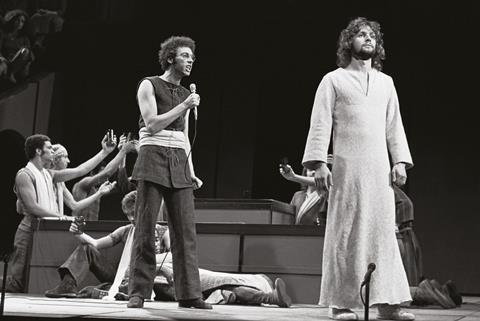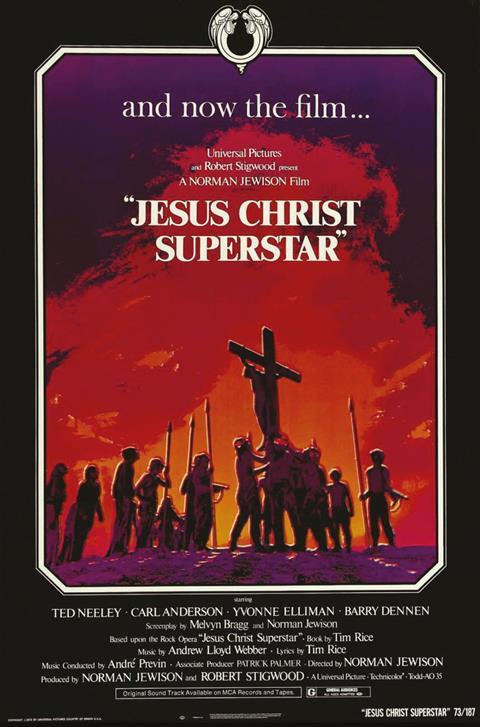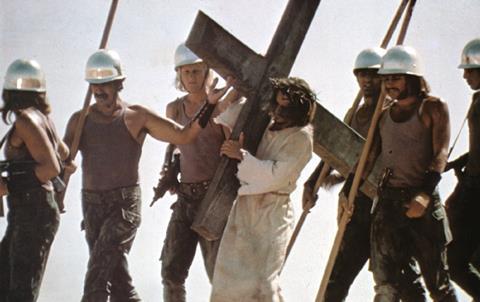Billy Graham said it bordered on blasphemy. Comedian Tim Minchin dubbed it a ‘radical atheist’ production. But 50 years on from its London debut, this classic rock musical endures. Were the protests of yesteryear misguided?
When audiences flocked to London’s Palace Theatre in the summer of 1972 to see the opening of a new musical about Jesus, they were greeted by protesters on both sides of the religious divide.
One angry nun held up a placard that declared: “I am a bride of Christ, not Mrs Superstar”, while members of the National Secular Society handed out leaflets entitled ‘Jesus Christ Supersham’.
Tim Rice and Andrew Lloyd Webber’s rock musical may not have been welcomed by raging secularists or angry nuns, but everyone else seemed to love it. Jesus Christ Superstar has since become one of the most successful shows of all time.
Alongside the classic album that topped the US Billboard charts, the 70s also gave us a classic Hollywood movie. Arena tours and major stage productions all over the world have followed. There was even a primetime ITV talent show, fronted by Amanda Holden, to find the next Jesus (Superstar, 2012). The new Messiah came from Sunderland.
It’s hard to think of any other piece of entertainment from the last 50 years that has done more to bring Jesus into the popular culture. But as evidenced by those early protests, the musical has produced an unusual mixture of Christian and non-Christian reaction, even among its fans. Comedian and atheist Tim Minchin, who once played Judas in a successful UK arena tour, described the show as a “radical atheist musical”.
Yet, back in 1972, the album was added to the Vatican Radio’s playlists. And, following a screening of the movie, Pope Paul VI was reported to have said: “I believe it will bring more people around the world to Christianity than anything ever has before.

Let me entertain you
So is Jesus Christ Superstar the ultimate evangelistic tool, or a counterproductive distraction from the true gospel message? Well, firstly, this musical was never intended to convert audiences to Christianity. It was designed to entertain.
The show reimagines the last few days leading up to Jesus’ crucifixion. Christ is portrayed as a modern-day celebrity. He’s vain, angry and, at times, overwhelmed by his own sense of destiny. For some, this very human portrayal (plus the use of rock music and slang-filled lyrics) may feel too irreverent, or plain silly, for the subject matter. But it can also bring the story to life in visceral and appealing ways.
When Jesus throws out the traders from the temple (“My temple should be a house of prayer / But you have made it a den of thieves”), he does so with a wailing electric guitar and full-on rock scream that would liven up most Sunday morning reading rotas.
When Herod goads Jesus with a camp Charleston number, it’s undeniably entertaining: “Prove to me that you’re no fool / Walk across my swimming pool.” In stark contrast, the trial that follows is full of musical tension and lyrical melodrama.
Often, the songs add a dry humour to familiar Gospel scenes. During the entry to Jerusalem, Jesus’ adoring fans sing his praise in a jubilant chorus. But the crowds are fickle and their shouts of “Hosanna” are turned into a nonsense lyric: “Hey sanna sanna sanna ho / Sanna hey sanna.”
Similarly, with the bread and wine at the last supper, the clueless disciples sing about wine to a dreamy, hymn-like melody: “Look at all my trials and tribulations / Sinking in a gentle pool of wine.” Shortly after, Jesus uses the bread to reprimand their complacency: “For all you care / This bread could be my body.”

Through the years
1969
‘Superstar’ is released as a single
1971
Jesus Christ Superstar is released as a double album
1972
Jesus Christ Superstar opens at the Palace Theatre in London, starring Paul Nicholas as Jesus. It goes on to enjoy a record-breaking eight-year run
1973
Jesus Christ Superstar movie is released, having been filmed in Israel and directed by Norman Jewison
1996
Jesus Christ Superstar is revived at the Lyceum Theatre in London, starring Steve Balsamo as Jesus
2012
Following an ITV casting show, Superstar, Ben Forster is cast as Jesus in a new UK arena tour alongside Tim Minchin as Judas and Mel C as Mary Magdalene
2016
A new concert-style production at Regent’s Park Open Air Theatre wins the Olivier award for Best Musical Revival
2018
Jesus Christ Superstar Live in Concert is broadcast on NBC as an Easter Sunday special, starring John Legend, Sara Bareilles and Alice Cooper
2021
The original concept album is re-released for its 50th anniversary with previously unheard demos and rarities
2022
The first all-female cast recording is released with a superstar line-up including Morgan James, Shoshana Bean and Cynthia Erivo

A cynical counterpoint
Perhaps even more controversial than the rebranding of Jesus or the musical style is the portrayal of Judas. Lyricist Tim Rice was originally inspired by a line from a Bob Dylan song: “You’ll have to decide / Whether Judas Iscariot / Had God on his side.” This line from ‘With God on our side’ prompted Rice to retell the story from Judas’ point of view. So Judas acts as a cynical counterpoint to Jesus who, he believes, is falling for his own divine hype.
In the opening number of the musical, ‘Heaven on their minds’, Judas sets out his uneasy warning to a jittery guitar riff: “If you strip away the myth from the man / You will see where we all soon will be.”
These days, many would share Judas’ point of view. They are sympathetic with the idea of Jesus the man, but are sceptical about Jesus the myth; that doesn’t necessarily make them – or the musical – anti-Christian. It’s simply that the musical is more concerned with drama than theology. Like many a modern audience, the musical remains theologically neutral.
When the original album was released in 1971, the apparent lack of a resurrection proved to be one of the most controversial issues. It was the reason why Billy Graham suggested that the show was “bordering on blasphemy and sacrilege”.
The album ends with Jesus dying in agony on the cross and speaking the famous words from John’s Gospel: “It is finished” (19:30). The words are accompanied by a frantic, painful cacophony of musical instruments. Suddenly, this gives way to a string lament and a brief reprise of the melody used when Judas betrayed Jesus.
On stage and screen, however, this has been played out in very different ways. In the 1996 West End revival, Jesus’ body was simply lowered from the cross as the stage faded to black. In the award-winning 2018 NBC telecast, the cross was hoisted in the air and craned off in a blaze of floodlights.
A staging that seemed to imply a resurrection, not to mention a bigger budget. The 1973 movie lands somewhere in-between. ending with the image of an empty cross at sunset and, in the foreground, the vague silhouette of a shepherd leading his flock.
Similarly, on the central question of whether Jesus is who he claims to be, the musical plays a remarkably straight bat. So much so that two people could easily come away with completely different interpretations.
An atheist could see the musical as a straightforward tragedy: Jesus goes to his death, lost in his divine delusion right up to the bitter end. A Christian, on the other hand, may pick up on how Jesus sacrifices his worldly success for something much greater. What’s remarkable is that both interpretations work in the context of the show. It’s not so much a radical atheist musical as a radically agnostic one.

Who is Jesus?
There is, I think, one final reason Jesus Christ Superstar continues to capture the imaginations of believers and non-believers alike. Ultimately, when it comes to the show’s central message, the clue is in the title. What these young and pre-ennobled writers managed to do was quite audacious.
They linked the most important story in Western history with a big modern idea. Not the idea of celebrity per se but the idea of the celebrated self.
This modern idea urges us to see past mere celebrity; to get beyond the public image to the real person underneath. The problem is that in a culture of because-you’re-worth-it shampoo ads, this ‘real person’ is often its own version of the celebrated self. And God wants to do away with that.
This is one way of understanding what happens in Jesus Christ Superstar. Jesus is stripped of his celebrity status and, along with Judas, we begin to see the real Jesus underneath. Only, that’s not enough; he’s called to sacrifice not only the public image, but his real self too.
The key moment in this regard is ‘Gethsemane’, a big solo number that depicts Jesus’ prayer before his arrest. In it, with a typically contemporary take on the original language, he runs the gamut of human emotions, from uncertainty to despair before, finally, acceptance: “God, thy will is hard / But you hold every card / I will drink your cup of poison.”
Although, even at the end of the song, he’s somewhat equivocal: “Take me now / Before I change my mind.” It’s a very modern attempt to imagine Jesus’ struggle with his own sense of self. But it’s also an expression of one of the central statements of discipleship: “If any want to become my followers, let them deny themselves and take up their cross and follow me” (Mark 8:34, NRSVA).
In the end, this is what is so incomprehensible to Judas and, by extension, to us. In a culture of the celebrated self, to deny that self is akin to madness. For the show’s grand finale, and with an irony worthy of Mark’s Gospel, Judas is resurrected to belt out the showstopping number ‘Superstar’ and sneer at the crucified Christ.
It’s a song dripping with bemused cynicism and baffled indignation: “Every time I look at you I don’t understand / Why you let the things you did get so out of hand?” It’s a perfect anthem for our confused modern culture. The song ends with a mock-triumphant fanfare: “Jesus Christ Superstar / Do you think you’re what they say you are?” Fifty years later, it’s a question that our culture is still trying to answer.




































No comments yet